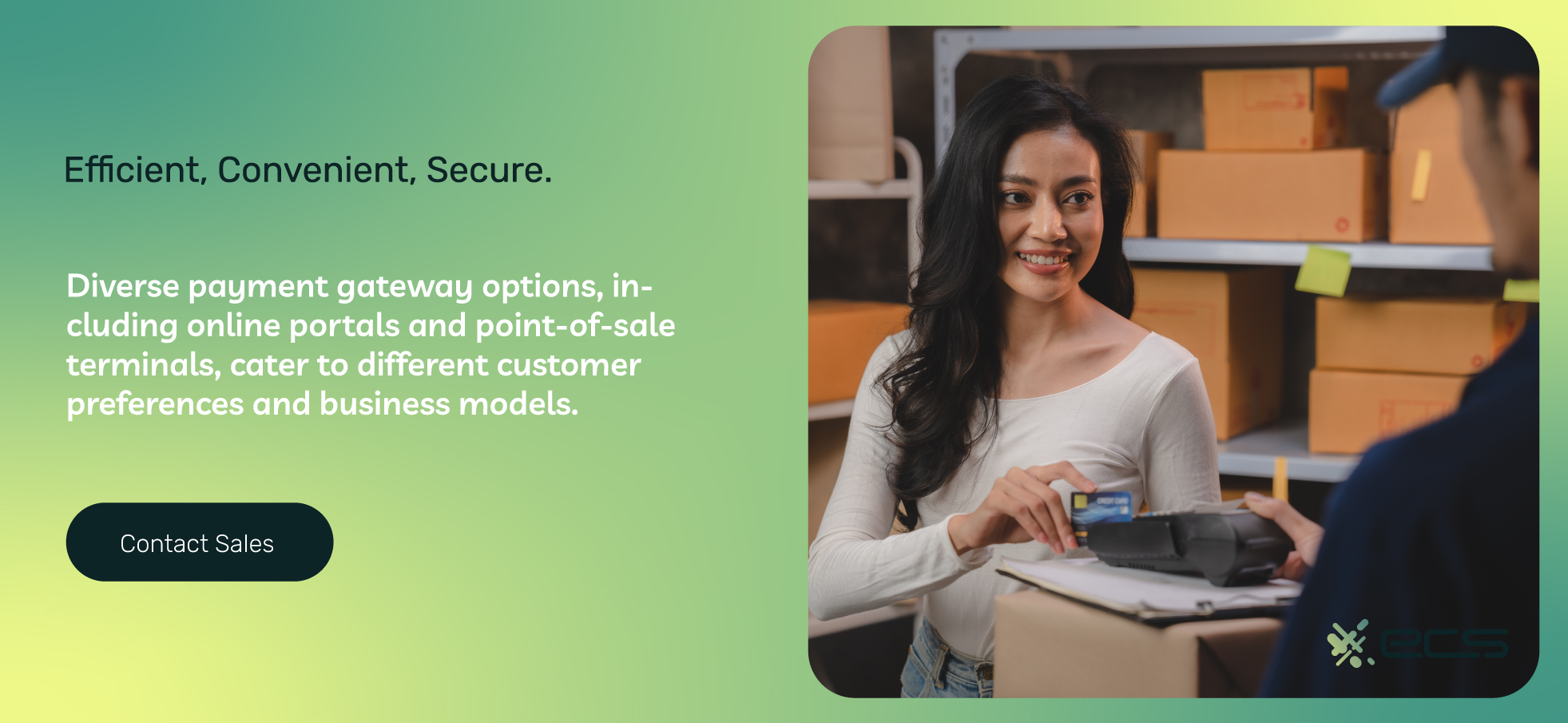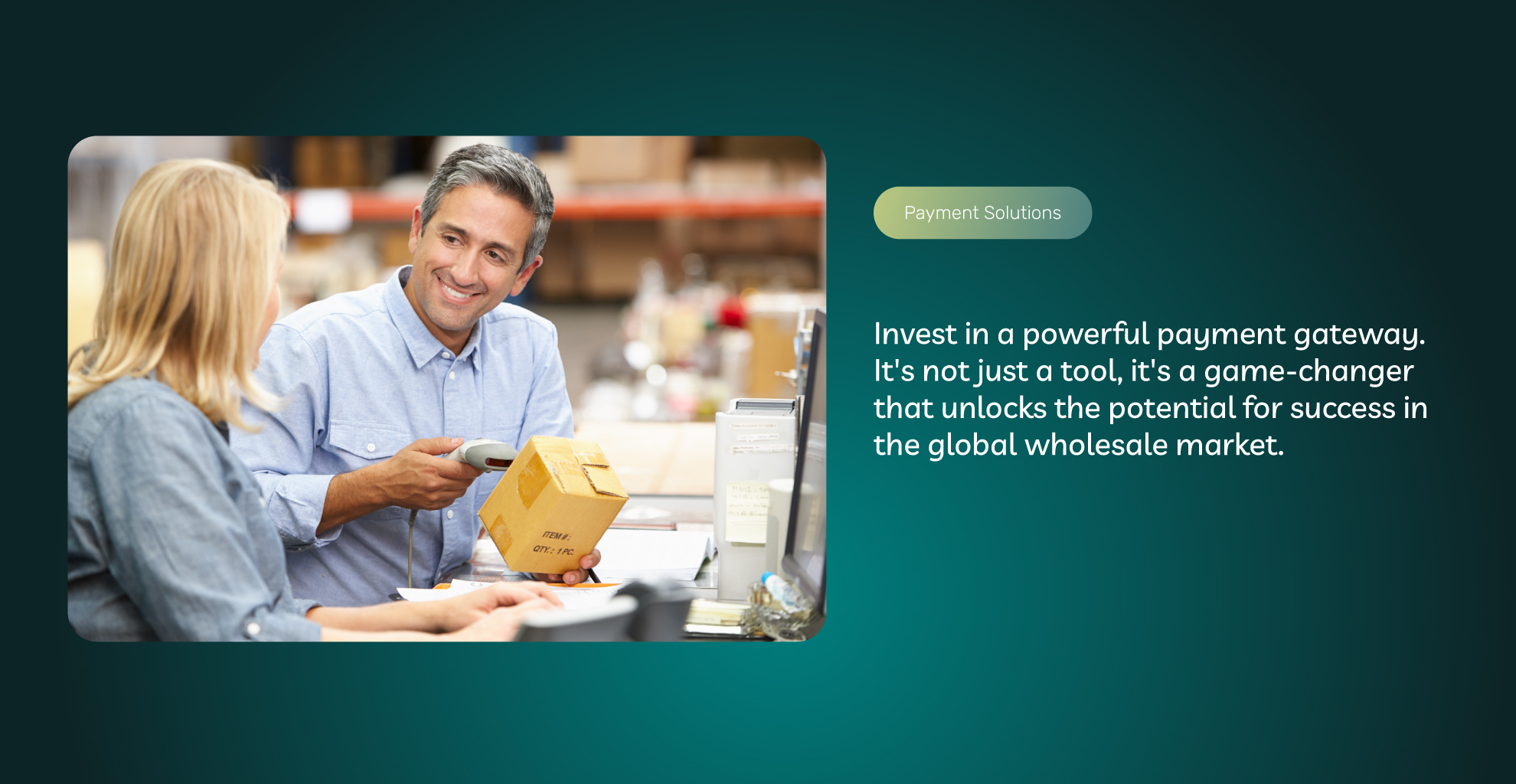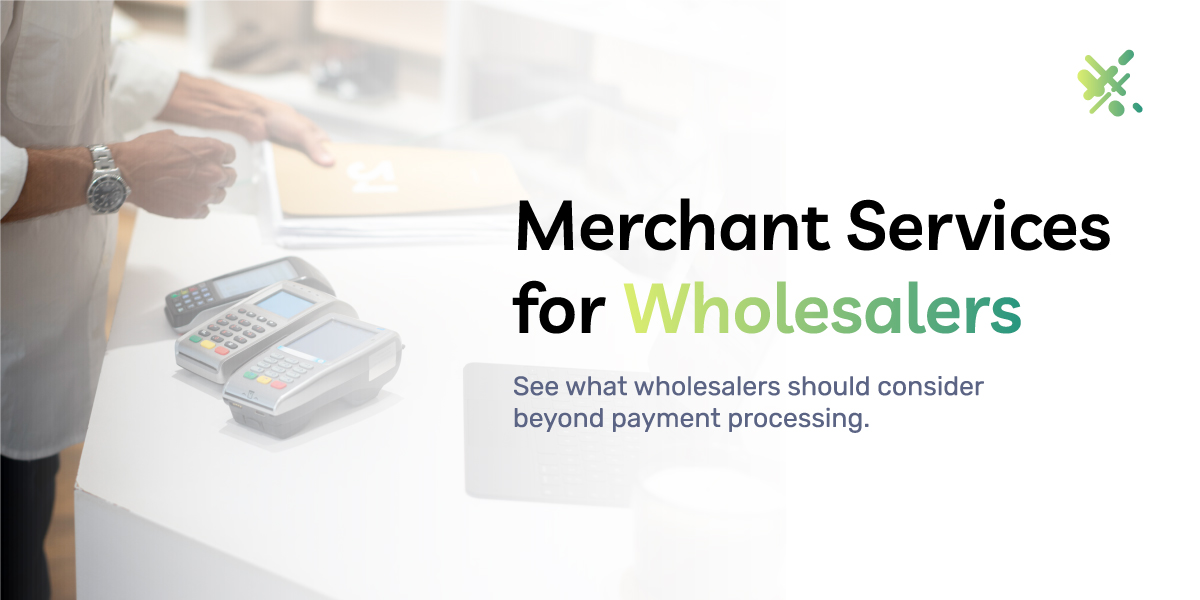Wholesalers are those who connect manufacturers and retailers. They are a vital link in the chain of events from raw materials to consumers. And that unique place in the supply chain means they have some unique needs in merchant services.
Merchant services refer to the range of services associated with collecting payments. However, merchant service providers can do more than just facilitate wholesale credit card processing services alone. As we will see, other services like loans and software suites can complement merchant processing systems for collecting payments.
Payment Processing For Wholesalers
A primary component of merchant services for wholesalers is wholesale payment processing, including wholesale debit and credit card processing and ACH payments. Debit and credit card processing involves the hardware and software for accepting payments at a point of sale (POS) terminal or online.
Credit and debit transactions are subject to card processing fees. The credit card networks (Visa, Mastercard, Amex, and Discover) and issuing banks (the bank that manages the card) have transaction fees and interchange fees.
All these different fees are usually wrapped up into what is called the merchant discount rate. This rate reflects the overall cost of running credit and debit card transactions. Wholesalers need payment solutions with a little more nuance than retailers because of how wholesale margins typically work.

Wholesale Vs. Resale Margins and Fees
Retailers can capitalize on the value of their “brand” to mark up goods, which is why dinner for two at P.F. Changs costs $60 (including the tip), even if the food only costs half that amount (or less) to prepare. Wholesalers do not have this luxury.
To be fair, retailers have many more overhead expenses: higher-priced real estate, marketing, and more labor, to name a few. These expenses make it so that they must add significant markup to their sales.
Retail profit margins generally run from 20-50%, while wholesale profit margins range from 15-30%. Yes, some wholesalers indeed see profits of 100% or more. However, by and large, wholesalers see lower margins. Now, what does that have to do with fees?
Credit card processors charging flat fees between 2-3% do not bother retailers as much. If a retailer has a profit margin of 50%, these fees will take it down to 47%. Sure, there is room for improvement, but 47% is not a bad margin.
Now compare that to a wholesaler seeing a 20% margin. 3% takes it down to 17%, which is significant because the margin was already low. Wholesalers will want to do everything they can to avoid chipping away at their already thin margins if they’re going to improve their profits.
Fee Structures Explained
Mainly there are three types of card processing fee structures: interchange plus, tiered, and flat rate. We’ve already touched on flat rate structures. Typically, Stripe, Square, and PayPal type companies offer these flat-rate schemes to merchants. There may be some nuance as transaction volumes increase, but not much.
Next, let’s touch on tiered pricing. Tiered pricing puts different types of cards into three categories: qualified, mid-qualified, and non-qualified. These tiers are partially set up regarding how much risk each type of card presents.
For instance, debit and credit cards with no rewards are typically in the qualified tier with the lowest prices. These cards are less risky and have lower servicing fees than foreign cards and business cards with amped-up rewards (both of which are non-qualified).
Interchange Plus Pricing For Wholesalers
Interchange plus pricing matters for wholesalers because most of your customers will want to use business cards with rewards. Business owners use credit cards with higher limits to make larger purchases more frequently than consumers. They want to rack up airline miles, cash back, or hotel stays.
But that leaves you shouldering the most punitive pricing. Banks and financial institutions that offer merchant services usually offer tiered pricing structures (also called bundle pricing). Banks are very risk-averse (especially after 2008). The steeper fees for “riskier” cards (e.g., more at risk of fraud, as one concern) are meant to protect the bank…not your margins.
Your best bet is something called interchange-plus pricing. Interchange-plus pricing is a more transparent model that reflects the actual cost of running a card through the networks plus some markup for the payment processor.
MCC Codes
Visa, Mastercard, American Express, and Discover all have different fees. Credit and debit cards technically have different fees. Different banks have different fees. And different merchant types have different fees. These fees are based on the Merchant Category Code or MCC.
Based on the entire scope of activities your wholesaling business does, you may qualify for a particular MCC that has more advantageous fees. For example, even though Costco is a wholesaler, its MCC with banks is typically that of a grocery store.
The nature of your MCC will depend on what types of products you wholesale and who your customers are. Speak to your payment processor about the most advantageous MCC you could have applied to your business. Usually, these MCC codes cannot be changed once assigned, but it is possible.
Merchant Cash Advance Services For Wholesalers
One indispensable merchant service for wholesalers is the merchant cash advance. A merchant cash advance (MCA) is a unique type of loan. The repayment of the loan is drawn from sales—specifically card transactions.
The automated nature of these repayment plans means that creditworthiness and collateral (or lack thereof) are less critical. The primary consideration is your transaction volume. It also rules out merchants who don’t take debit and credit card transactions.
As a wholesaler, most payments are routed through card networks or the ACH network. This volume of processed payments (as opposed to cash) will provide you with a robust profile that is attractive to merchant cash advance (MCA) lenders.
Your payment processor can be an MCA lender. They are the most familiar of any party with the nature and volume of your card transactions. Consequently, they are the most optimized for assessing and providing your MCA options.
Retailer Versus Wholesaler Uses of Merchant Cash Advance
You can use cash advances to carry your operating costs in slow periods. Retailers typically use MCA loans for this purpose—escaping the doldrums. However, wholesalers have additional reasons to find the merchant cash advance alluring.
Wholesalers sell in bulk, but they also purchase in bulk. Sometimes, the price of a bulk purchase might be beyond their current budget. But the potential money they could make from that particular inventory—selling it to retailers—could be very lucrative.
MCA financing can bridge the gap between what they want and what they don’t have. Wholesalers like their inventory to move quickly so that also works as well. MCA loans can have higher interest rates and are meant to be short-term solutions. A wholesaler can get a loan, purchase the inventory, and unload it quicker than a retailer might be able to.


Online Payment Gateways For Wholesalers
Over the last few years, wholesale markets have gone global, with companies like Alibaba making serious inroads into marketplaces outside of China. Can you compete with behemoth-sized vendors? You most certainly can.
However, you can only compete if you have an easy way for long-distance customers to place orders. Mailing in checks and even picking up the phone to call are not easy ways of placing and paying for orders. You need an online payment gateway.
Payment gateways should be integrated with your customer-facing website (as opposed to a customer getting redirected to a payment page). They should be easy to use and understand for the customer. They should offer flexible pricing structures for customers who need Net-30 arrangements.
Payment gateways should also integrate with other software suites, mainly accounting and inventory software. When a customer makes an online purchase, ensure seamless integration with inventory systems to eliminate manual data transfers.
The same goes for accounting. Payments made online should integrate with your accounting software, eliminating the need for manual transfers. Manual transfers of data account for a significant percentage of accounting mistakes, which can have huge financial repercussions (especially during tax season).
Wholesale Credit Card Processing Security
Your in-store sale POS systems (for wholesalers like Costco with retail footprints) and online payment gateways must be secure. One aspect of security is how you store customer payment information.
Storing customer payment information is important, especially in wholesale; one can reasonably assume that most of your customers will be making repeat, recurring payments to restock their consumer-facing inventory.
However, you cannot simply keep a spreadsheet of customer names and credit card numbers. There are very specific rules about how payment data must be stored. Visa and Mastercard set forth these rules in something called Payment Card Industry Data Security Standards.
Staying PCI compliant can be quite expensive. Large corporations are often able to meet PCI standards with their own internal resources: IT teams, auditing teams, and data storage. However, small to midsize wholesalers (or any business, for that matter) often do not have the resources to meet PCI compliance standards independently.
The easiest way to store and manage customer payment data is to have a payment processor do it for you. The payment processor that has set up and maintains your online payment gateways will have the resources to securely store data and protect transactions from online fraud.
Wholesale Merchant Services For Flexible Payments and Invoicing
Most of your customers (the retailers) will want flexible payment terms like Net-30 instead of COD (cash on delivery). Then, of course, there are other nuanced layers like 2-10 Net 30 (e.g., a 2% discount for bills settled within ten days).
If you have dozens or hundreds or thousands of customers, this is not possible to juggle. Keeping track of who is on day 29 versus who is on day eight, who has 2-10 options, and who doesn’t is a nightmare.
Once again, this is where wholesale merchant services come into play. Your payment processor can customize software packages for invoicing and billing management. As mentioned earlier, these invoices and payments can also integrate with inventory and accounting software.
Some payment processors can also offer buyer financing. For consumers, this is typically called BNPL, or buy now pay later. The BNPL market comprises key players like Klarna, Affirm, and Afterpay. But these fintech companies typically hit merchants with 6% fees, even while customers pay no interest.
Point Of Sale Financing For Wholesale Customers
As mentioned above, with flat-rate credit card processing fees, that size fee won’t work well for wholesalers with thin margins. Could you imagine getting hit with a 3% processing fee and another 6% of the sale afterward? Even if you had a decent 20% margin, you’d be down 14%.
Incidentally, although we didn’t mention it before, we should discuss why these profit margins matter. You certainly want the profit margins to be as good as possible. But they also matter to investors outside your business looking in. If you ever want to expand or go public, you need robust financials, like the best possible profit margins.
Every little bit counts. And in the case of point-of-sale financing, 6% is no small amount. A payment processor who offers point-of-sale financing for your customers may be able to offer better rates or more flexible fee terms for you. The upside is that you will get your money immediately (usually within 48 hours), while your customers can get the flexibility they enjoy with Net-30 or Net-60 arrangements.
Merchant Services Customer Support For Wholesalers
Within wholesale merchant services responsive customer care from a merchant services provider is crucial. If worse comes to worse and payment systems go offline, a retailer can always say it’s cash-only day. Wholesalers do not have this luxury.
For starters, most of their payments will already be credit, debit, and ACH payments. Many of them are going to be automated. If payments go offline, it can take a lot of work to reboot and recollect the payments that didn’t go through.
Large payment processing companies have notoriously bad customer service that retailers are known to complain about. Often, companies like Square, Stripe, or PayPal have a generic catchall customer service number. They do not provide dedicated account managers to their own customers.
A smaller company dedicated to the wholesale industry can provide better customer care. Customer care starts with the sales process. That’s because sales often involve discussing that business’s unique needs and challenges with an account manager. The account manager will then work with sales engineers to develop a product that fits the customer’s needs exactly.
An account manager is the point person for this discussion and may remain the point person for the lifetime of the relationship (some companies pass this torch on to a customer success manager). Either way, there is someone (a real person) with a phone number and an email you can reach out to get things resolved.
When thinking about wholesale merchant services, do not underestimate the value of customer care and whether or not the merchant services provider will be responsive. A good time to test this out is during the sales process. Remember to keep your testing reasonable and avoid bizarre questions about side quests for cursed rings or buried treasure.

ACH Payments
It’s a good idea to discuss taking ACH payments with your wholesale merchant services provider. ACH payments involve moving money from a checking account to another account using the ACH (automated clearing house) network. There are no card networks involved in these types of transactions.
Consequently, the fees for these transactions are often lower. Whereas card transactions range between 2-3%, ACH transactions might be as low as $1 or less per transaction. ACH transactions are impossible in consumer-facing retail settings because it is cumbersome for customers to find banking information.
However, ACH transactions are easy enough to facilitate when someone sits at a desk and places bulk orders. The upside of ACH transactions for wholesalers is that wholesale orders are typically large. Paying a few dimes for a $1,500 order sure beats $45. This payment solution with hundreds or thousands of transactions can quickly increase savings.
Wholesale Analytics
Another exciting opportunity is in the area of analytics. This involves taking data from your transactions and examining it. The examination can reveal helpful insights about customer behavior: what sells, what doesn’t, when it sells, when it doesn’t, and what orders customers typically pair together.
Analytics are made possible by software, such as online payment gateways and payment processing software. In addition to the aforementioned way such software can integrate with accounting and inventory, it can also give you detailed insights about your sales. You can then use these insights to fine-tune further big-picture decision-making.
Wholesale Merchant Services Wrap-Up
Merchant services often refer to payment processing, but they also include services like merchant cash advance loans, customer financing, secure storage, online payments, ACH payments, and analytics. As mentioned, don’t forget to consider the value and importance of customer care.
To learn more, give ECS Payments a call or fill out the form below. We’d love to hear from you about your wholesale business, your challenges, and your goals.
Frequently Asked Questions About Merchant Services For Wholesalers
Because wholesale transactions involve larger volumes and wholesalers typically operate on narrower profit margins than retailers, nuanced fee structures are essential. Often, retailers can better absorb flat-rate fees, but these fees can significantly impact profitability for wholesalers. ECS Payments offers transparent and customizable fee structures for our merchants.
ECS Payments recommends interchange-plus pricing for wholesalers. Interchange-plus transparently reflects the true cost of processing cards through credit networks, providing a fairer balance for wholesalers who accept various card types.
The MCC code that the processor assigns is based on your business activities. It influences the processing fees you incur. Be careful to advertise exactly what you do and offer to your payment provider to receive the proper MCC selection aligned with your product types and customer base. This can help optimize transaction costs.
Responsive customer support is important for any merchant service provider to have for their clients. However, because wholesalers rely heavily on automated and remote transactions, responsive customer care ensures quick resolution if payment systems go offline. Preventing disruptions in payment continuity. Dedicated account managers and in-house support are features often lacking in larger processors. However, ECS Payments offers personalized assistance for smoother operations.
